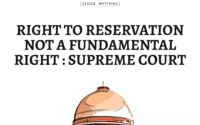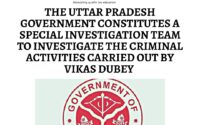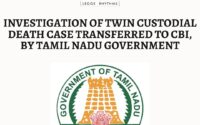Delhi Court Denies the Bail of Pregnant Student Safoora Zargar
This article is written by PRATHA WAGHMARE
A Delhi Court on Thursday denied bail to Jamia Milia University student Safoora Zargar, who has been in custody since April 10 in a case under the Unlawful Activities Prevention Act for an alleged conspiracy behind Delhi riots.
27- year old Zargar is in the second trimester of her pregnancy.
The prosecution alleged that her “inflammatory speech” on February 23 led to violence and rioting in North East Delhi.
Additional Sessions Judge Dharmender Rana of Patiala House Court observed that there is a prima facie evidence to show that there was a “conspiracy to at least blockade the roads(chakka jam)”.
As per the words of the judge :
“I am not discussing in detail the particulars of the prosecution witnesses so as not to unnecessarily prejudice the ongoing investigation and the safety and security of the witnesses are also one of my primary concerns. However, from the statement recorded under Section 161 and 164 CrPC coupled with the WhatsApp chat available on record, it can be safely inferred that there is prima facie evidence to show that there was a conspiracy to at least blockade the road(chakka jam). As per the provisions of Section 339 of the Indian Penal Code, causing wrongful restraint to even a single person is a penal offence. Section 141 clause 3 provides that any assembly of five or more persons is designated as “unlawful”, its common object is to commit any offence”
The judge also added that there was a prima facie case for invoking UAPA against her :
“From the material on record, one cannot ignore the case of the prosecution that the accused persons have conspired to cause disruption to such an extent and such a magnitude that it would lead to disorderliness and disturbance of law and order at an unprecedented scale. Therefore, I cannot but disagree with the Ld. Defence Counsel that the provisions of UAPA could not have been validly invoked in the case at hand”, the judge said.
The advocates for Zargar – Trideep Pais, Ritesh Dhar Dubey and Sanya Kumar – argued that she was only holding legitimate and peaceful protests against the Citizenship Amendment Act in accordance with her constitutionally guaranteed fundamental right to speech and expression. The mere holding of opinion against the government cannot be “sedition” or “disaffection against the state”, they contended.
Even if the prosecution case is accepted for argument sake, there is no scope for invoking UAPA against her, the counsel argued in the alternative.
The prosecution submitted that there was enough material to show that the accused was involved in the Delhi riots. The Prosecutor referred to copies of Whatsapp chats of the accused, and statements of witnesses to justify the invocation of UAPA. It was stated that there was an embargo on granting bail under Section 43D(5) of the UAPA if the court is satisfied that there was a prima facie case.
Prima facie agreeing with the prosecution, the judge said that “any activity which has a tendency to create a disorder or disturbance of law and order to such an extent that an entire city is brought to its knees and entire government machinery is brought to a grinding halt, such an activity would obviously be an unlawful activity within the meaning of Section 2(o) of UAPA”.
The Court also said that it cannot agree with the defence counsel that the accused is only liable for her speeches and acts and the acts of other members cannot be read against her.
“In my considered opinion, if there is a prima facie case evidence of the existence of a conspiracy, the evidence of acts and statements made by one of the conspirators in furtherance of the common object is admissible against all”, the judge said.
“Further, even if no direct violence is attributable to the applicant/accused, she cannot shy away from her liability under the provisions of the said Act. When you choose to play with embers, you cannot blame the wind to have carried the spark a bit too far and spread the fire. The acts and inflammatory speeches of the co-conspirators are admissible under Section 10 of the Indian Evidence Act even against the applicant/accused”.
The Court said that even without considering the sanctity of materials on record, the statutory embargo under Section 43D(5) of UAPA is attracted in the case.
The Court also discarded the objection against registration of the second FIR noting that “during the course of the investigation a larger conspiracy is discernible and a second investigation by way of a separate FIR to unravel the entire conspiracy sounds not only logical but is perfectly legal”.


